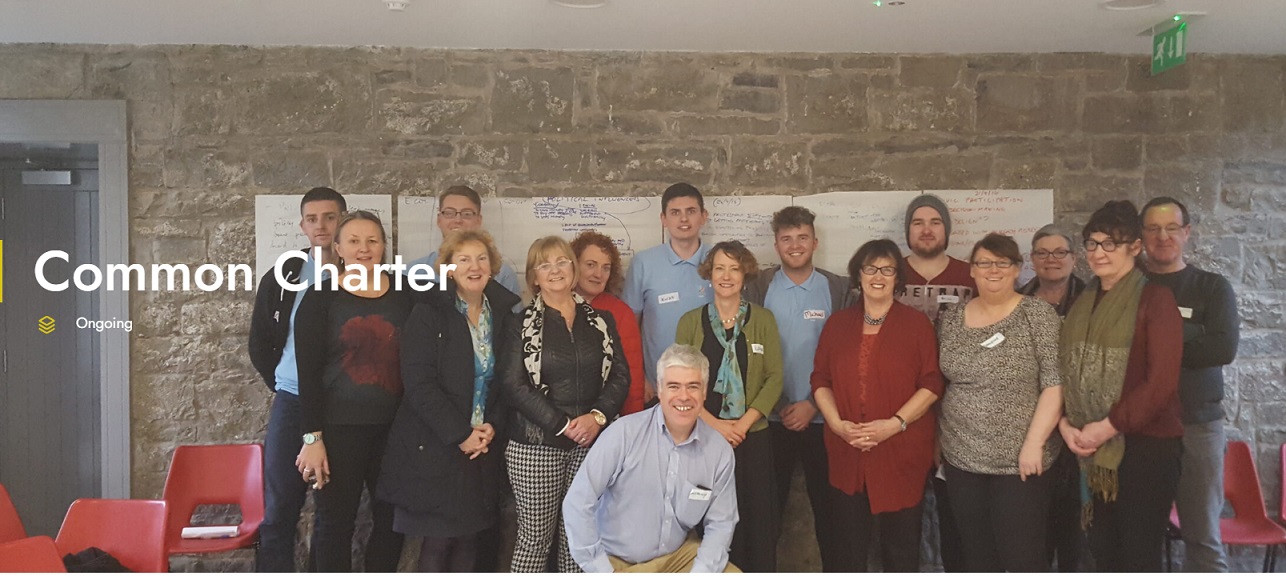The New Common Charter for Cooperation Within and Between These Islands
Home > Case StudiesThe New Common Charter for Cooperation Within and Between These Islands

The ‘New Common Charter for Cooperation within and between these islands’ aims to highlight and empower civic society organisations as drivers of cooperation, North-South and East-West. Facilitated by the Centre for Cross Border Studies (CCBS), the Charter was initially developed by a range of organisations from the island of Ireland, with further input from organisations in England, Scotland and Wales. It is essentially a set of agreed principles for civic society organisations participating in North-South and East-West cooperation.
This includes, but is not limited to, recognising the importance of:
- Increasing opportunities to share information, knowledge of policy and best-practice within and across these islands
- Improving policy-making by matching it to realities on the ground
- Identifying cross-border opportunities to collaborate to solve shared problems or exploit common resources
- Engaging with and supporting human rights, particularly for the most isolated and marginalised in our communities.
- Facilitating the exploration and celebration of a community’s culture and heritage with a view to future cooperation.
Those civil society organisations that fed into the Charter believe that grass-roots community cooperation within and between these islands can usefully contribute to the following issues among others:
- Building inclusive communities
- Capacity-building for community leadership in cooperation, especially for emerging leaders
- Exploiting the potential of cross-border tourism, especially rural tourism, which includes not only the Northern Ireland-Ireland border, but also the Wales-England and Scotland-England borders
- The exploration of histories and heritage that cross borders within and between these islands
- Improving women’s representation in decision-making structures
- Promoting the need for affordable, accessible quality childcare and social care support
- The promotion and support for gender equality proofing and gender budgeting
- Advocating for the provision of affordable, accessible and regular transport services, especially in rural areas and border regions
- Promoting the need to facilitate educational opportunities within and between these islands, including through the removal of any undue administrative and/or financial obstacles that may discourage the movement of learners across these islands
- Advocating for the improvement of the value given to and the quality of vocational and non-university paths to careers
- Promotion and support for rural proofing and regionally balanced budgeting and resourcing.
The project to create these agreed principles came about due to the generous support of the Joseph Rowntree Charitable Trust, the Department of Foreign Affairs’ Reconciliation Fund, and the Community Relations Council. CCBS facilitated an action research project that resulted in the development of the New Common Charter for Cooperation Within and Between these Islands, representing grassroots support for collaborative and sustainable North-South and East-West relations.
The ‘Common Chapter’, from which the original idea came, was the replicated text in Ireland’s National Development Plan and Northern Ireland’s Structural Funds Plan (2000-2006), setting out the two Governments’ priorities for North-South cooperation and how EU funds would be used to support them. However, through this project CCBS worked with a range of civil society organisations between 2014 and 2019 from both sides of the Ireland-Northern Ireland border, as well as organisations in Great Britain, to produce the New Common Charter that voices the aspirations and needs of civil society and led to a vision of cooperation and what it should entail. The Charter continues to grow its supporter base and be utilised in 2022. A full list of the current supporters of the Charter is available below.
The process of creating the Charter included disseminating the draft New Common Charter to other community groups on the island of Ireland, as well as to other stakeholders, and gathered feedback on its contents. The participating groups from Ireland and Northern Ireland then undertook a process of engagement with counterparts from England, Scotland and Wales. This stage concluded with an evaluation seminar, where representatives from all the groups worked on a final version of the New Common Charter.
The final stage involved representatives from the groups promoting the New Common Charter with policy and decision-makers on the island of Ireland and Great Britain.
In terms of lessons learned, this work resulted in informed and motivated community organisations on the island of Ireland and Great Britain being able to engage with policies and policy-makers on the value of cross-border cooperation and ensuring that it addresses the needs of civic society. While achieving political support for cross-border cooperation is an important goal, this project also was a step in helping to create the conditions at community level for independent engagement in cross-border initiatives. Most importantly, the Charter acts as an informal network of civic society groups committed to identifying cross-border opportunities to collaborate to solve shared problems or exploit common resources.
The principles of the New Common Charter continue to feed into work of the Ad Hoc Group for North-South and East-West Cooperation; a network of civil society groups from across the island of Ireland working on the front lines of cooperation, and which CCBS convenes. The Group was established as the prime contact point for purposes of meaningful consultation between cross-border civil society and regional, national and EU bodies on matters relevant to cooperation between Northern Ireland and Ireland, and between the island of Ireland and Great Britain.
While there have been a broad range of issues discussed with the relevant parties during the course of meetings, there have been largely constant themes raised by the Ad-Hoc Group:
- The need for a structured process of engagement with Civil Society, and in particular with the Ad-Hoc Group for North-South and East-West Cooperation in the post-transition period.
- Consideration be given to the impact of the implementation of the Protocol on Ireland/Northern Ireland on cross-border cooperation on the island of Ireland.
- Border-proofing must become a common policy in all relevant jurisdictions on a North/South, East/West basis.
Much of this work of the Ad Hoc Group to ensure that North-South and East-West collaborative relations between civic society organisations are protected and strengthened, is rooted in the principles of the New Common Charter.
During the creation of the New Common Charter civil society organisations in England, Scotland and Wales, found it instructive to discuss which of the priorities and perspectives overlapped and differed in different jurisdictions, each of which represents its own context for key themes of the Charter including rights, language, and culture. One of the challenges arising from this learning process, however, was unpacking concepts that may have been familiar to organisations on the island of Ireland, but understood or valued differently by those in Great Britain. Another challenge was dealing with Brexit, as the UK referendum on EU membership took place after the project was already more than a year underway. The key was to remind ourselves of the original purpose of what would become the New Common Charter: civil society’s recognition of the value of North-South and East-West cooperation. That value was there before Brexit, during Brexit, and above all after Brexit.
Alongside the Charter’s supporter organisations, we will continue to work on:
- The organisation of workshops on the island of Ireland and Great Britain to promote and gain new supporters for the New Common Charter and facilitate conversations around its principles.
- Organising and convening quarterly meetings of supporters of the New Common Charter, both on a supporter-wide and a sectoral basis, to take stock of the conditions for cooperation within and between these islands in the context of the Charter’s principles.
To learn more or to become a supporter of the Charter please email megan.mcdermott@qub.ac.uk
Supporters of the New Common Charter as of May 2022:
- Advice NI
- Aontas
- Bolster Community
- Border People
- Cooperation Ireland
- County Armagh Community Development
- Drum Development Association
- Human Rights Consortium
- Irish Rural Link
- Joseph Rowntree Charitable Trust
- Longford Women’s Link
- Migrant Rights Centre Ireland (MRCI)
- Monaghan Women’s Network
- National Women’s Council of Ireland
- North West Forum of People with Disabilities
- Northern Ireland Council for Voluntary Action (NICVA)
- Northern Ireland Rural Women’s Network (NIRWN)
- Northern Ireland Youth Forum
- NUS-USI Northern Ireland
- Roscommon Women’s Network
- Rural Community Network
- SCoTENS
- Women’s Tec
- Youth Work Ireland
The full text of the New Common Charter as well as a live list of supporters can be accessed on the CCBS website here.


